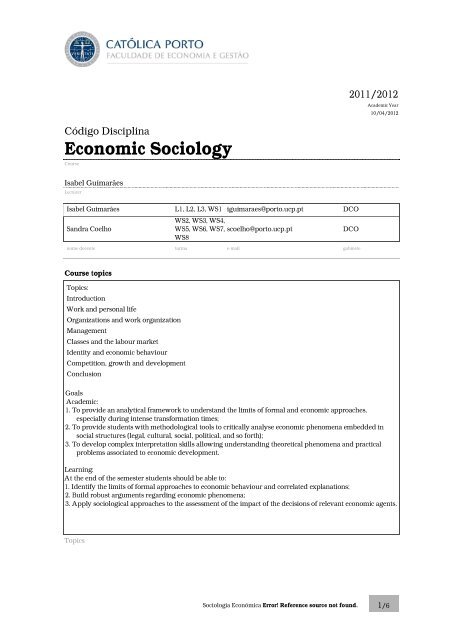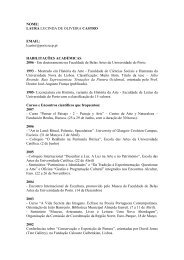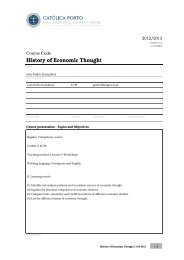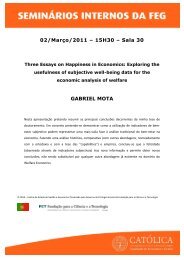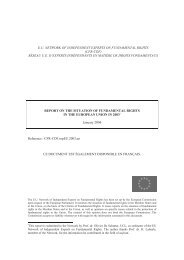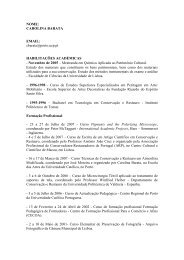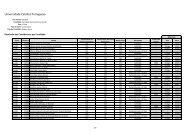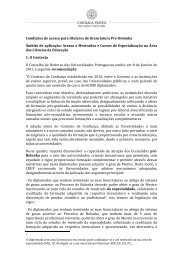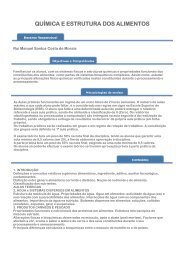Economic Sociology
Economic Sociology
Economic Sociology
You also want an ePaper? Increase the reach of your titles
YUMPU automatically turns print PDFs into web optimized ePapers that Google loves.
2011/2012<br />
Academic Year<br />
10/04/2012<br />
Código Disciplina<br />
<strong>Economic</strong> <strong>Sociology</strong><br />
Course<br />
Isabel Guimarães<br />
Lecturer<br />
Isabel Guimarães L1, L2, L3, WS1 iguimaraes@porto.ucp.pt DCO<br />
Sandra Coelho<br />
WS2, WS3, WS4,<br />
WS5, WS6, WS7, scoelho@porto.ucp.pt<br />
WS8<br />
DCO<br />
nome docente turma e-mail gabinete<br />
Course topics<br />
Topics:<br />
Introduction<br />
Work and personal life<br />
Organizations and work organization<br />
Management<br />
Classes and the labour market<br />
Identity and economic behaviour<br />
Competition, growth and development<br />
Conclusion<br />
Goals<br />
Academic:<br />
1. To provide an analytical framework to understand the limits of formal and economic approaches,<br />
especially during intense transformation times;<br />
2. To provide students with methodological tools to critically analyse economic phenomena embedded in<br />
social structures (legal, cultural, social, political, and so forth);<br />
3. To develop complex interpretation skills allowing understanding theoretical phenomena and practical<br />
problems associated to economic development.<br />
Learning:<br />
At the end of the semester students should be able to:<br />
1. Identify the limits of formal approaches to economic behaviour and correlated explanations;<br />
2. Build robust arguments regarding economic phenomena;<br />
3. Apply sociological approaches to the assessment of the impact of the decisions of relevant economic agents.<br />
Topics<br />
Sociologia Económica Error! Reference source not found. 1/6
Syllabus<br />
A – Introduction (weeks 1 and 2)<br />
1. <strong>Sociology</strong> and economic sociology<br />
2. The classics<br />
3. Different views on economic sociology<br />
4. The sociology of economic behaviour<br />
(Chapter 1 of Fevre (2003))<br />
B – Work and personal life (weeks 3 and 4)<br />
1. Classical views<br />
2. The effects of the bureaucratic order<br />
3. The impact of women’s “social revolution<br />
4. Division of work: the gender effect<br />
5. Reconciling work and family life<br />
(Chapter 2 of Fevre (2003))<br />
C – Organisations and work organisation (week 5)<br />
1. The impact of the rational organisation of work<br />
2. Informal groups<br />
3. Emotional labour<br />
4. Work place culture<br />
(Chapter 3 of Fevre (2003))<br />
D – Management (week 6)<br />
1. Managerial efficiency<br />
2. Managerial rationality and legitimacy<br />
3. Contingency theory<br />
4. Critical views<br />
(Chapter 4 of Fevre (2003))<br />
E – Classes and the labour market (week 7)<br />
1. Meritocracy; economic rationality and social justice<br />
2. Mobility and competition in the labour market<br />
3. The sociology of labour markets<br />
4. Classes and income inequality<br />
5. Embeddedness<br />
(Chapter 5 of Fevre (2003) on the idea of embeddedness: Granovetter e Swedberg (2992))<br />
F – Identity and economic behaviour (week 8)<br />
1. Identity and learning<br />
2. Social stratification<br />
3. Work and identity<br />
(Chapter 6 of Fevre (2003))<br />
G – Competition, growth and development (weeks 8 and 9)<br />
1. Capitalism and industrial organisation<br />
2. The crisis of capitalism<br />
3. Globalisation and post-Fordism<br />
4. The impact of norms<br />
5. Wage policies and economic development<br />
(Chapter 7 of Fevre (2003))<br />
H – Conclusion (week 10)<br />
Topics will be worked in the respective workshop. Bibliographic references are mandatory.<br />
<strong>Economic</strong> <strong>Sociology</strong> Error! Reference source not found. 2/6
Bibliography and other mandatory references<br />
Fevre, Ralph (2003). The New <strong>Sociology</strong> of <strong>Economic</strong> Behaviour. London; Thousand Oaks, New Delhi: Sage<br />
Bibliography<br />
Complementary references<br />
Biggart, Nicole W. (edit.) (2002) Readings in <strong>Economic</strong> <strong>Sociology</strong>. Malden, Oxford: Blackwell<br />
Bourdieu, Pierre (2005). The Social structures of the Economy. Malden; Cambridge: Polity Press<br />
Granovetter, Mark e Swedberg, Richard (editors) (1992). The <strong>Sociology</strong> of <strong>Economic</strong> Life. Boulder, Oxford:<br />
Westview Press<br />
Gorz, André (1989). Critique of <strong>Economic</strong> Reason. New York, London: Verso<br />
Additional references will be provided as the semester develops.<br />
Complementary references<br />
<strong>Economic</strong> <strong>Sociology</strong> Error! Reference source not found. 3/6
Assessment<br />
The course follows the General Assessment Rules enforced at the Faculty of <strong>Economic</strong>s and Management.<br />
Students are encouraged to opt for continuous assessment, which entails a number of specific requirements.<br />
Students have two attempts to pass the course: (1) following continuous evaluation; and (2) taking an exam<br />
(resit). Resit testes are limited to a maximum of 24 ECTS per academic year.<br />
a. Continuous evaluation<br />
Continuous evaluation includes the following components:<br />
1. Continuous assessment exercises (CAE) – started during the lectures<br />
and concluded in the following workshop;<br />
2. Writing an argumentative essay with at least 5 adequately justified<br />
and a minimum of 3,500 words. Students may decline the essay, in<br />
which case the grade will be absorbed by both the CAE and the tests;<br />
3. Two intermediary tests. The final grade will be the mean of their<br />
marks.<br />
Attendance<br />
and<br />
participation<br />
CAE Essay 2 Tests<br />
% + 50% + 5%(0) + 45% (50%) + % + %<br />
NOTA: Os ponderadores dos elementos de avaliação contínua devem totalizar 100%<br />
To pass the course students must get at least 7,5 marks in the Final Exam<br />
(0-20 scale).<br />
Continuous<br />
Evaluation<br />
(CE)<br />
Final Exam<br />
(FE)<br />
If students attain at least 8,5 marks on the Continuous Evaluation, the<br />
final grade will be that of the Final Exam, provided that this favours the<br />
student.<br />
60% 40%<br />
<br />
Max <br />
PG; 0,6 AC 0, 4 PG <br />
<br />
b. Resit<br />
Final Exam<br />
(FE<br />
Classificação<br />
Final<br />
100%<br />
Resit exams are limited to a maximum of 24 ECTS per academic year. Continuous evaluation marks are lost if<br />
the student decides to take the resit exam.<br />
<strong>Economic</strong> <strong>Sociology</strong> Error! Reference source not found. 4/6
Academic agenda - <strong>Economic</strong> <strong>Sociology</strong><br />
Lecture 1 – Topic 1 Lecture 2 – Topic 1 Lecture 3 - Topic 2 Lecture 4 - Topic 2 Workshop 5 -<br />
FEEDBACK<br />
Assessment Schedule:<br />
Workshop 1 –<br />
Induction<br />
Workshop 2 - CAE1 Workshop 3 - CAE2 Workshop 4 - CAE3 1st Intermediary test<br />
Week 1 Week 2 Week 3 Week 4 Week 5<br />
Intermediary Tests: Weeks 5 and 9<br />
Essay<br />
Week 8<br />
Lecture 5 – Topic 3 Lecture 6 – Topic 4 Lecture 7 – Topic 5 Workshop 9 -<br />
FEEDBACK<br />
Workshop 6 – CAE 4 Workshop 7 – CAE 5 Workshop 8 – CAE 6 2nd Intermediary<br />
Test<br />
Final Exam<br />
January 2013<br />
Final Exam (resit)<br />
January 2013<br />
Week 6 Week 7 Week 8 Week 9<br />
Lecture 8 – Topic 6-7 Lecture 9 – Topic 7 Lecture 10 – Topic 8<br />
Workshop 10 – CAE 7 Workshop 11 – CAE 8 Workshop 12 - CAE 9<br />
Week 10 Week 11 Week 12 Week 13 Week 14<br />
This table details the course works by identifying topics, exams and written work. During the semester the lecture may require students to perform other assessment exercises as mentioned on the<br />
\faculty's assessment rules.<br />
<strong>Economic</strong> <strong>Sociology</strong> Error! Reference source not found. 5/6
Remarks<br />
In this course students’ success depends upon two main factors:<br />
a) The level of commitment and b) the readings.<br />
1. The level of commitment. Students are required to attend and participate both on the lectures and<br />
workshops. The CAE start in the lectures (with readings and related questions) and are to be<br />
concluded during the workshops: Thus, failing to attend a lecture entails losing the credit for the<br />
respective CAE, even if the student has accomplished it;<br />
2. The CAE is group work. Groups are to be chosen by the lecturer and will include no more than 5<br />
members;<br />
3. At the start of the semester each student is awarded 20 points regarding the CAE. The level of<br />
commitment of each student will determine whether the student is to keep the 20 points of not. (Out<br />
of the 9 CAE will be considered in terms of assessment and points awarded;<br />
4. Attendance to all the 10 lectures and 12 workshops leads to a one mark that is to be added to the<br />
final continuous evaluation grade of the student. This bonus applies only to student who will attend<br />
and actively participate on the lecture. No absence can be justified for this purpose. ;<br />
5. Students are expected to have done the required readings.<br />
<strong>Economic</strong> <strong>Sociology</strong> Error! Reference source not found. 6/6


